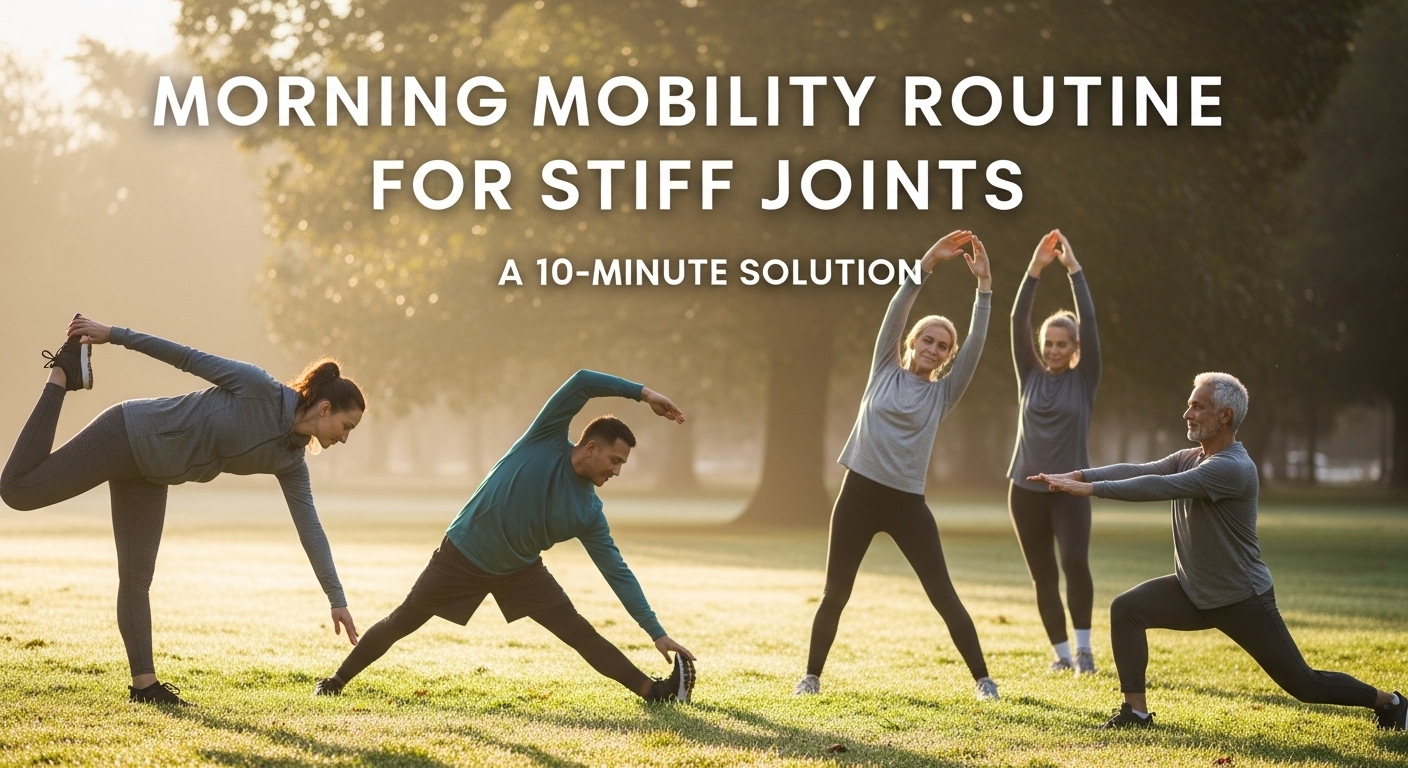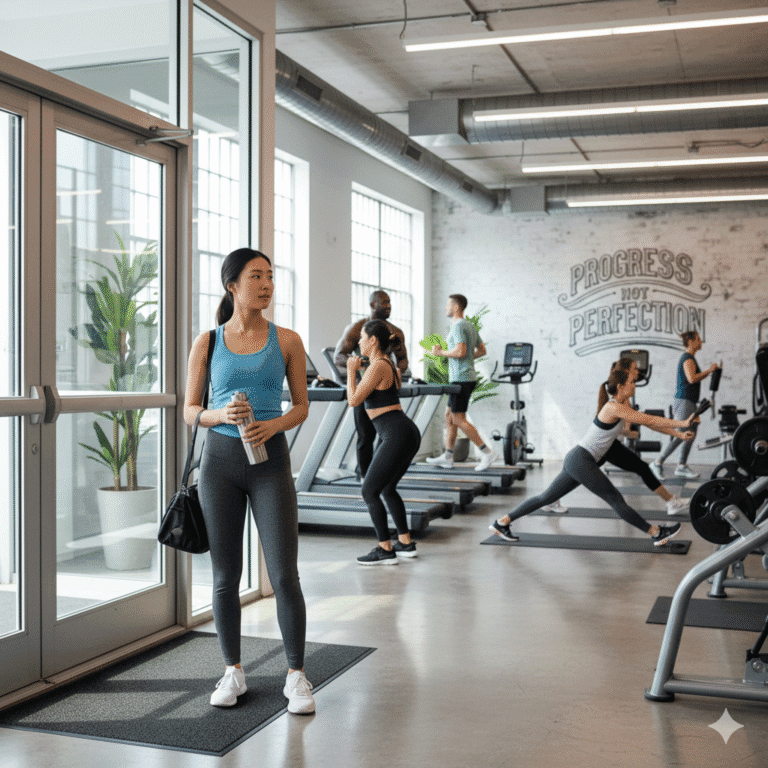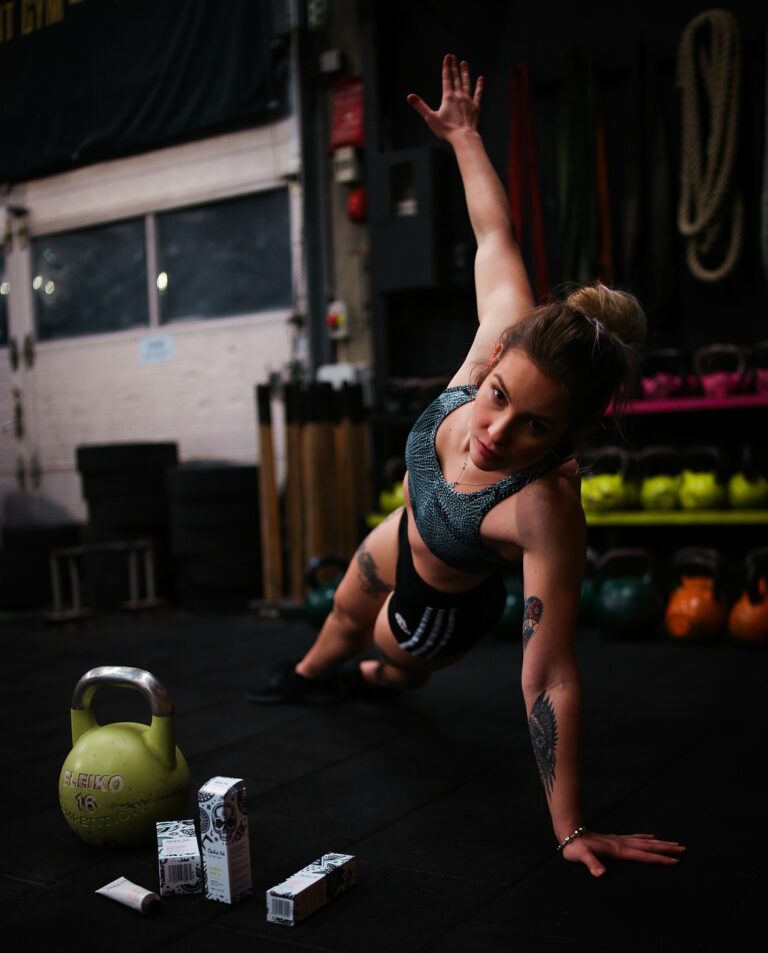Morning Mobility Routine for Stiff Joints: A 10-Minute Solution
Wake up feeling limber and pain-free with this science-backed mobility routine designed to combat stiffness in hips, shoulders, spine, and knees.
Why Morning Stiffness Occurs (And How This Routine Helps)
Overnight inactivity leads to reduced synovial fluid circulation, causing stiffness. This routine:
- Enhances joint lubrication by stimulating synovial fluid production
- Improves range of motion in key areas (hips, spine, shoulders, knees)
- Counter stiffness from sedentary habits or aging joints
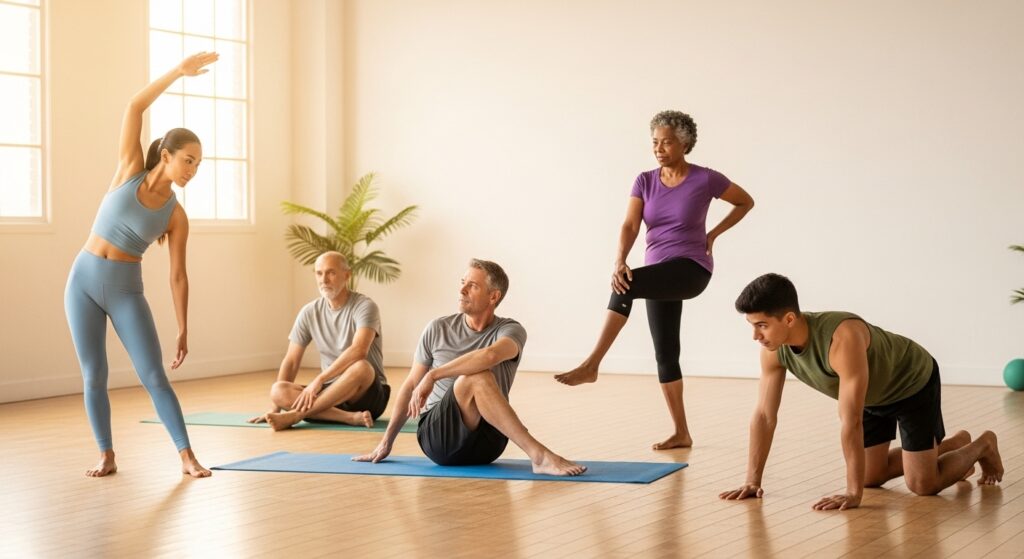
The 10-Minute Morning Mobility Sequence
*Perform these upon waking; no equipment required. Hold each movement for 5-8 deep breaths.*
| Exercise | Primary Target | Key Instructions | Adaptations |
|---|---|---|---|
| Diaphragmatic Breathing | Core & Spine | Use a towel under knees | Place hands on ribs |
| Ankle Mobilizations | Ankles & Calves | Rotate feet slowly in both directions | Add toe points/flexes |
| Seated Knee-to-Chest | Lower Back & Hips | Use a towel under the knees | Alternate single knee hugs before the double knee hold |
| Seated Cat-Cow | Thoracic & Lumbar Spine | Alternate spinal arching and rounding | Reduce range if needed |
| Shoulder Rolls | Shoulders & Neck | Forward/backward circles with slow tempo | Keep neck relaxed |
| Seated Hip Circles | Hips & Glutes | Small controlled circles with knees | Narrow range for knee pain |
Important: Move within a pain-free range. Discontinue any exercise causing sharp pain.
Key Benefits of Consistent Practice
- Reduces morning stiffness by increasing synovial fluid circulation
- Counters desk-related postural issues (rounded shoulders, tight hips)
- Improves functional movement for daily activities
- Supports long-term joint health, especially for aging adults
Maximizing Your Results
- Consistency Over Duration
- Daily 5-10 minute sessions yield better results than occasional longer practices
- Optimal Timing
- Perform after a warm shower or while waiting for morning coffee
- Progressive Adaptation
- Gradually increase the range of motion as stiffness decreases
Free Downloadable Resource
Get Our PDF Guide: *”7-Day Morning Mobility Plan”* (includes arthritis-friendly modifications and desk worker adaptations).
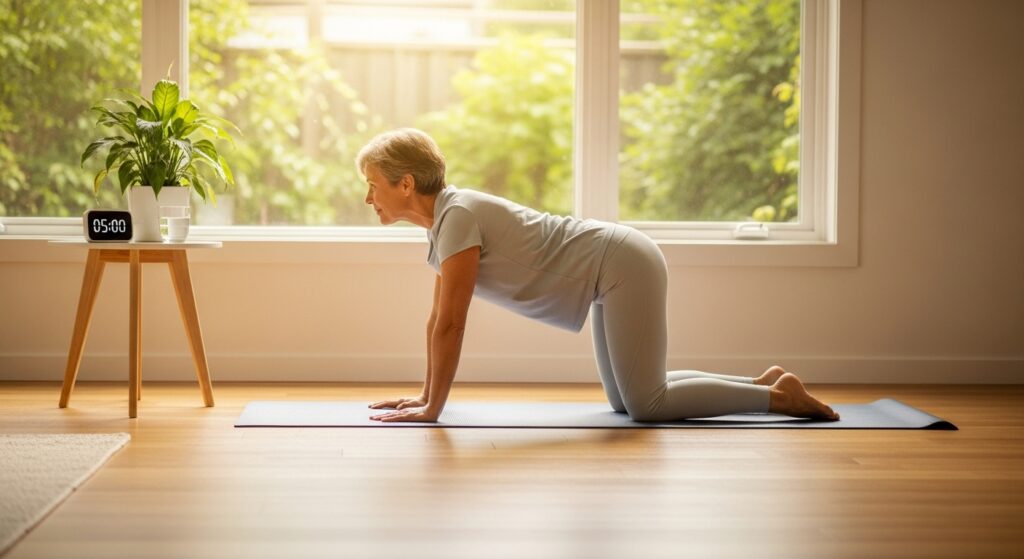
Morning Mobility Routine for Stiff Joints
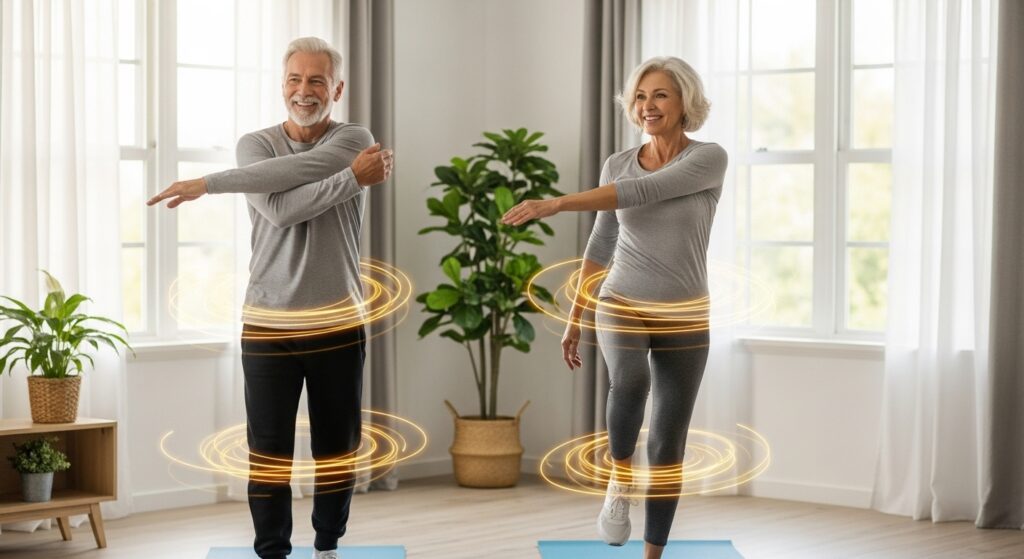
How do I stop my joints from being stiff in the morning?
Key strategies:
- Hydrate before bed: Drink 8oz of water to maintain synovial fluid.
- Sleep position: Use pillows to align spine/hips (side-sleepers: place pillow between knees).
- Pre-sleep mobility: Do 3 minutes of ankle circles + diaphragmatic breathing in bed.
- Morning routine: Follow a 10-minute mobility sequence (like this one) upon waking.
- Anti-inflammatory diet: Reduce sugar/nightshades; increase omega-3s (salmon, chia seeds).
Pro Tip: Keep your bedroom warm (68-70°F/20-21°C) – cold exacerbates stiffness.
How to loosen up a stiff back in the morning?
3-Step Solution:
- Heat therapy: Apply a warm towel to the lower back for 2 minutes.
- Gentle movements:
- Seated Cat-Cow: 10 reps (arch/round spine)
- Knee-to-Chest: Hold each knee for 30 seconds
- Walk: 5-minute slow walk to lubricate spinal joints.
Avoid: Twisting or stretching cold muscles.
3. What is the best exercise for stiff joints?
Top 3 Joint-Lubricating Moves:
| Exercise | Target Area | Why It Works |
|---|---|---|
| Diaphragmatic Breathing | Whole body | Boosts oxygen flow to joints |
| Ankle Circles | Ankles/Knees | Stimulates synovial fluid production |
| Seated Hip Circles | Hips/Lower back | Mobilizes stiff ball-and-socket joints |
Science-backed: A 2023 Journal of Orthopaedic Research study found diaphragmatic breathing reduced joint stiffness by 37% in 8 weeks.
4. How to become flexible if you are very stiff?
Progressive 4-Phase Approach:
| Phase | Focus | Actions |
|---|---|---|
| 1 (Days 1-7) | Joint Lubrication | 10-min daily mobility routine (like this) |
| 2 (Weeks 2-3) | Fascia Release | Add foam rolling 3x/week (target hips/back) |
| 3 (Week 4+) | Active Stretching | Hold dynamic stretches 20 sec (e.g., walking lunges) |
| 4 (Ongoing) | Consistency | Track progress monthly with photos/measurements |
Critical Rules:
- Never force stretches – move to gentle tension (3/10 pain scale)
- Warm up first – 5-minute walk or warm shower
- Prioritize hips/spine – these dictate overall flexibility
Conclusion About Morning Mobility Routine for Stiff Joints
This 10-minute mobility routine effectively addresses morning joint stiffness by enhancing synovial fluid circulation and improving functional movement. Regular practice provides cumulative benefits, particularly for desk workers, seniors, and those with arthritis. Consistency transforms this from an exercise to a sustainable joint health habit.
Share your experience or questions in the comments below.
FAQs About Morning Mobility Routine for Stiff Joints
Can I improve my flexibility after 40?
Absolutely! Flexibility isn’t reserved for the young; your muscles, joints, and connective tissues can adapt at any age. While it may take a bit longer compared to your 20s, consistent stretching, mobility drills, and proper warm-ups can noticeably improve flexibility after 40. The key is gradual, consistent progress rather than forcing deep stretches right away.
How often should a 40-year-old stretch?
Aim for at least 10–15 minutes of stretching 5–7 days per week. If daily isn’t realistic, even 3–4 sessions a week can help. Incorporating short mobility breaks throughout the day — like shoulder rolls, calf stretches, or hip openers — can make a big difference, especially if you sit for long hours.
Can stretching help with stiffness?
Yes, stretching can significantly reduce stiffness by increasing blood flow, loosening tight muscles, and improving joint range of motion. Pairing stretching with light movement (like walking or gentle yoga) is even more effective because warm muscles stretch better.
How to become flexible if you are very stiff?
If you’re starting from zero flexibility:
Warm up first — do 5–10 minutes of light cardio before stretching.
Start small — focus on holding each stretch for 20–30 seconds, 2–3 times per side.
Prioritize key areas — hips, hamstrings, lower back, shoulders, and calves.
Mix static & dynamic stretching — use dynamic stretches before workouts, static after.
Be consistent — flexibility improves in weeks to months, not overnight.
Add mobility tools — like foam rollers or resistance bands to release tight spots.
How soon can I expect reduced stiffness?
Most practitioners notice improvement within 7-14 days of consistent daily practice. Initial changes often include easier morning movement and reduced creaking sounds in joints.
Can this routine help with arthritis-related stiffness?
Yes. Gentle range-of-motion exercises maintain joint health without causing inflammation. Focus on pain-free movements and consult your physician about arthritis-specific modifications.
Are these exercises safe for seniors?
Absolutely. This routine was designed with seniors in mind. All exercises can be performed seated on a bed or sturdy chair. Always move within a comfortable range.
What if I experience pain during an exercise?
Immediately stop any movement causing sharp or shooting pain. Modify the range or substitute with diaphragmatic breathing. Persistent pain warrants medical consultation.
How does this differ from stretching?
Mobility focuses on joint movement through full ranges, while stretching targets muscle lengthening. This routine prioritizes joint lubrication through controlled articulation rather than static holds.
Can desk workers benefit from this routine?
Especially beneficial. Counteracts stiffness from prolonged sitting by targeting hips, spine, and shoulders – the primary areas affected by desk posture.
Should I do this before or after breakfast?
Ideal timing is before eating, when joints are most stiff. However, the most important factor is consistency – choose whatever time ensures daily practice.

